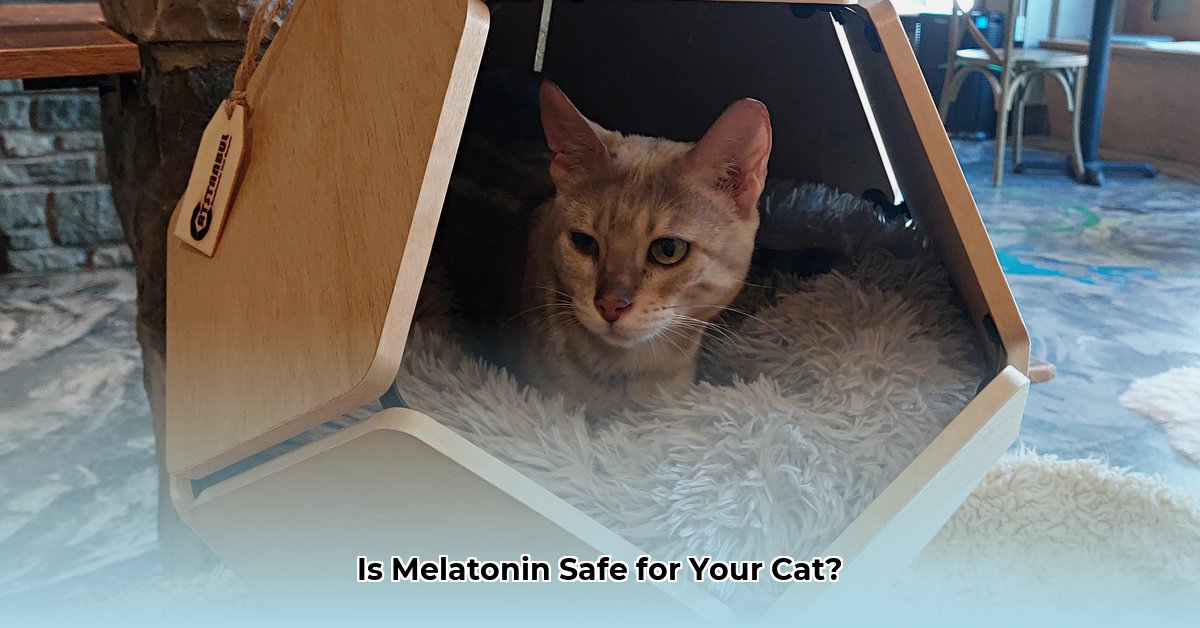Is your cat struggling with sleep or anxiety? Melatonin, a natural hormone, might offer a solution, but understanding its safe and effective use is paramount. For information on melatonin dosage for dogs, see this helpful guide: dog melatonin dosage. This guide provides detailed information about melatonin for cats, emphasizing safe dosages (always under veterinary supervision), selecting appropriate supplements, understanding potential side effects, and exploring alternative methods to promote relaxation and better sleep, ensuring your feline friend receives the best and safest care.
Understanding Melatonin and Its Role in Feline Health
Melatonin, a hormone naturally produced in the body, plays a crucial role in regulating the sleep-wake cycle. When a cat experiences sleep disturbances, restlessness, or anxiety, melatonin supplementation might be considered, but only with thorough veterinary consultation.
Melatonin’s Impact on Sleep and Anxiety in Cats
Many cats experience sleep disturbances or anxiety. While melatonin might offer relief in some cases, it’s essential to understand that research on its effectiveness in felines is still ongoing. We are continually learning how well it works, for which specific conditions it might be most beneficial, and which cats may respond most favorably. Does your kitty have trouble winding down at night? Are they pacing, meowing excessively, or acting restless when it’s time to sleep, even after a full day of activity? These could be signs that melatonin might be worth discussing with your veterinarian.
Safe Dosage Guidelines: The Primacy of Veterinary Consultation
Determining the correct melatonin dosage for your cat can be complex, as there is no universally applicable “magic number.” The absolute necessity is consulting your veterinarian before administering any melatonin supplement. Your vet will consider several critical factors, including your cat’s breed, size, age, overall health status, any existing medical conditions, and current medications, to determine the safest and most effective dose. Various online sources may offer dosage recommendations, often ranging from 1.5mg to 6mg, but these should never be followed without individualized veterinary guidance.
Step-by-Step Guide to Administering Melatonin Safely
Follow these steps to ensure you’re giving melatonin to your cat as safely as possible:
Step 1: Comprehensive Veterinary Consultation
Before even considering melatonin, schedule a thorough checkup with your veterinarian. This is crucial to rule out any underlying medical conditions that may be contributing to your cat’s sleep disturbances or anxiety. It also allows your vet to determine definitively whether melatonin is an appropriate option for your specific cat.
Step 2: Selecting a Feline-Specific Supplement
If your veterinarian approves the use of melatonin, it is imperative to obtain a supplement specifically formulated for cats. Human supplements often contain ingredients that can be toxic to felines, such as xylitol. Carefully read the label to ensure the product is designed for cats and free of harmful additives.
Step 3: Strict Adherence to Veterinary Instructions
Always adhere strictly to the dosage instructions provided by your veterinarian. These instructions will be tailored to your cat’s individual needs. Never deviate from the prescribed dose or frequency of administration without first consulting your vet.
Step 4: Palatability Enhancement
To make it easier for your cat to consume the melatonin, consider mixing the supplement into a small portion of their favorite wet food. This can help mask the taste and ensure they ingest the full dose.
Safety, Potential Side Effects, and Drug Interactions in Cats
Melatonin is generally considered safe for cats when used under veterinary guidance. However, potential side effects can occur, although they are typically mild, such as drowsiness or lethargy. Serious adverse reactions are rare, but it’s essential to be aware of the possibility. Furthermore, melatonin can potentially interact with other medications your cat may be taking. Always inform your veterinarian about all medications, supplements, and even herbal remedies your cat is receiving to prevent any potentially harmful drug interactions. According to vetexplainspets.com, the effects of melatonin can typically be observed within 30 minutes to an hour after administration.
Selecting High-Quality Melatonin Supplements for Felines
Only use veterinarian-approved melatonin supplements specifically formulated for felines. Human formulations may contain ingredients that are harmful or even toxic to cats. Quality is paramount when it comes to your cat’s health and safety. Look for cat-specific formulas that are certified free of xylitol (a common artificial sweetener that is extremely toxic to cats) and other potentially dangerous additives. Choose products that clearly and comprehensively list all ingredients and provide detailed dosage information. Reputable brands will often have undergone third-party testing to verify the purity and potency of their products.
Alternative Methods for Managing Sleep and Anxiety Issues in Cats
In addition to, or sometimes instead of, melatonin it is worth trying these alternatives to improve your cat’s sleep and reduce anxiety.
- Creating a safe, quiet, and comfortable sleeping environment.
- Using pheromone diffusers specifically designed for cats (such as Feliway) to create a calming atmosphere.
- Providing plenty of interactive toys and climbing structures to encourage physical activity and mental stimulation.
- Addressing any underlying behavioral issues with the help of a qualified veterinary behaviorist or certified professional cat trainer.
Frequently Asked Questions (FAQ)
- Q: Can I give my cat human melatonin supplements?
- A: Absolutely not. Human supplements may contain ingredients that are dangerous or even lethal to cats. Always use a product specifically formulated for felines and approved by your veterinarian.
- Q: How long can my cat safely take melatonin?
- A: The duration of melatonin use depends on your cat’s individual response to the supplement, the underlying cause of their sleep or anxiety issues, and your veterinarian’s recommendations. Long-term use should be carefully monitored by your vet.
- Q: My cat seems to be having a negative reaction to melatonin. What should I do?
- A: If you observe any signs of an adverse reaction, such as vomiting, diarrhea, excessive drooling, difficulty breathing, or significant changes in behavior, discontinue use immediately and contact your veterinarian without delay.
Conclusion: Prioritizing Veterinary Guidance for Your Cat’s Well-being
The information provided in this guide is intended for educational purposes only and should not be considered a substitute for professional veterinary advice, diagnosis, or treatment. Always discuss the use of melatonin with your veterinarian before administering it to your cat. Ongoing research continues to refine our understanding of melatonin’s role in feline health; stay informed and always consult your veterinarian for the most current and personalized advice. Remember that veterinarian-approved, cat-specific melatonin supplements and close monitoring are paramount to ensuring your feline companion’s health and safety.
How to Safely Administer Melatonin to Your Cat for Anxiety Relief
Key Takeaways:
- Always consult your veterinarian before using melatonin for your cat; It may help with anxiety or sleep disorders, but professional guidance is critical.
- Dosage is highly individualized and depends on your cat’s specific needs and medical history.
- Use only feline-specific melatonin supplements to avoid potentially toxic ingredients found in human products.
- Carefully monitor your cat for any potential side effects and report them to your veterinarian promptly.
- Explore alternative solutions for managing anxiety before resorting to melatonin.
Understanding Melatonin
Melatonin is a natural hormone produced by the pineal gland, primarily responsible for regulating the sleep-wake cycle. It is readily available as an over-the-counter supplement and is widely used as a sleep aid in humans.
Melatonin and Cats: A Cautious Approach
Some veterinarians suggest that melatonin may help ease anxiety and insomnia in cats, particularly in situations like travel or vet visits. However, it’s important to acknowledge that scientific research on the effectiveness and safety of melatonin in cats is still limited. Dosage recommendations vary depending on factors such as weight, age, and overall health. Therefore, self-treating your cat with melatonin is risky, and the long-term effects of melatonin use in cats remain largely unknown.
Dosage: A Veterinary Mandate
Currently, there is no universally agreed-upon or standardized dosage of melatonin for cats. Dosage recommendations found online often lack rigorous scientific testing and validation. While starting with a very low dose (e.g., under 1 mg) might seem like a prudent approach, it should only be considered as a starting point for discussion with your veterinarian. Only your veterinarian can accurately assess your cat’s individual needs, consider any concurrent medications or health conditions, and determine whether melatonin is an appropriate treatment option and, if so, the most appropriate dosage.
Administration: Simple and Safe
Administering melatonin to cats is generally straightforward. Most supplements are available in easily administered forms, such as tablets or liquids. Your veterinarian will provide specific instructions on the optimal timing, method, and frequency of administration.
Side Effects and Safety Considerations
Melatonin is generally considered safe for cats, it can potentially cause mild side effects, including drowsiness, increased appetite, and mild gastrointestinal upset. In rare cases, more serious adverse reactions may occur. Use in pregnant or nursing cats should be avoided unless specifically approved by your veterinarian. The most commonly reported side effect is drowsiness.
Choosing a Melatonin Supplement
It is crucial to use only melatonin supplements that are specifically formulated and labeled for cats, and have been approved by your veterinarian. Human melatonin formulas are often unsuitable for cats because they may contain ingredients that are harmful or even toxic to felines, such as xylitol. Always carefully review the product label to ensure that the ingredients are safe for cats and that the dosage information is clearly stated.
- Stainless Steel Food Storage for Healthier, Eco-Friendly Meal Prep - February 27, 2026
- Stainless Food Containers Offer Durable Storage for Everyday Meals - February 26, 2026
- Stainless Steel Containers Offer Superior Food Preservation and Durability - February 25, 2026










